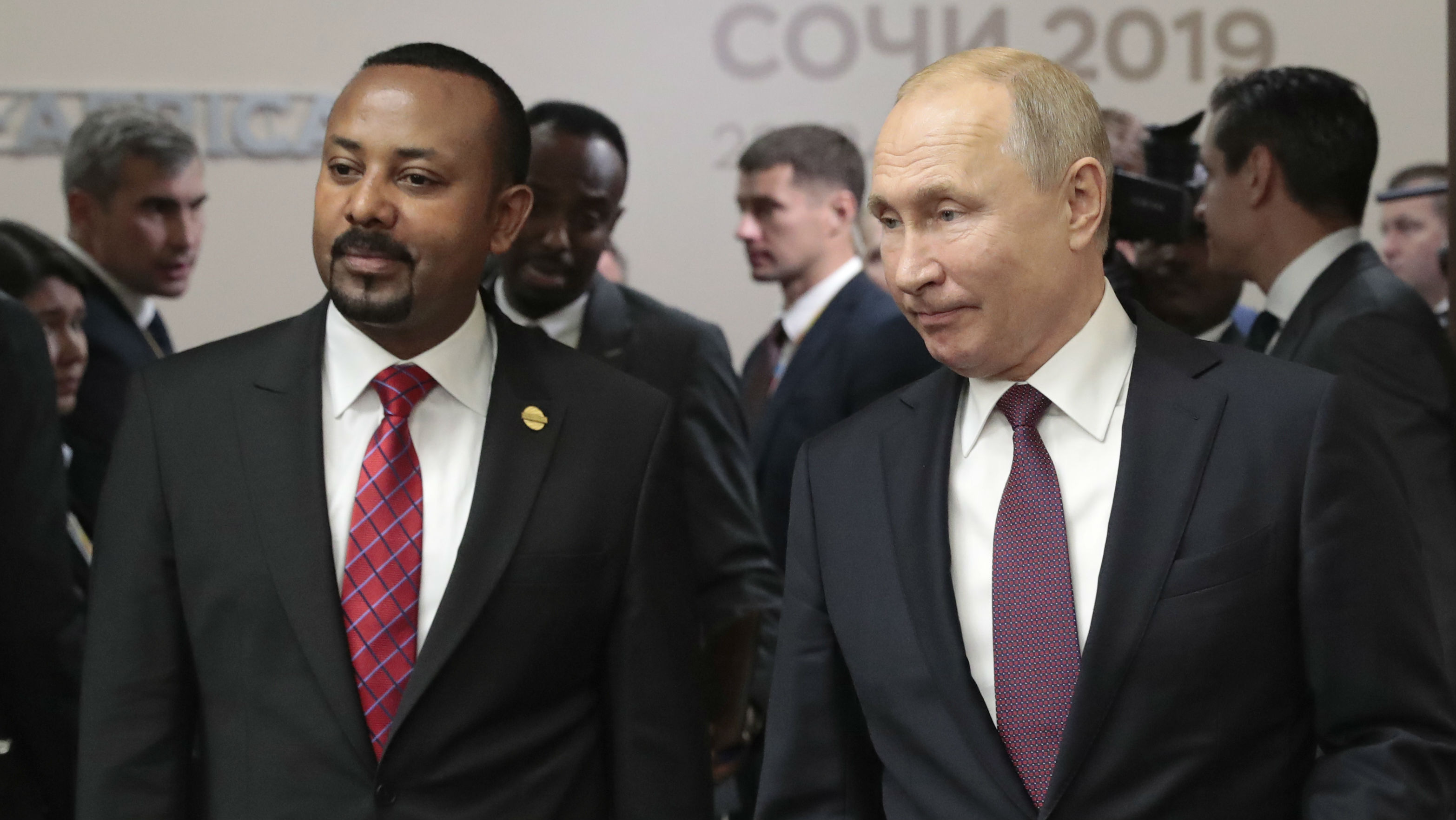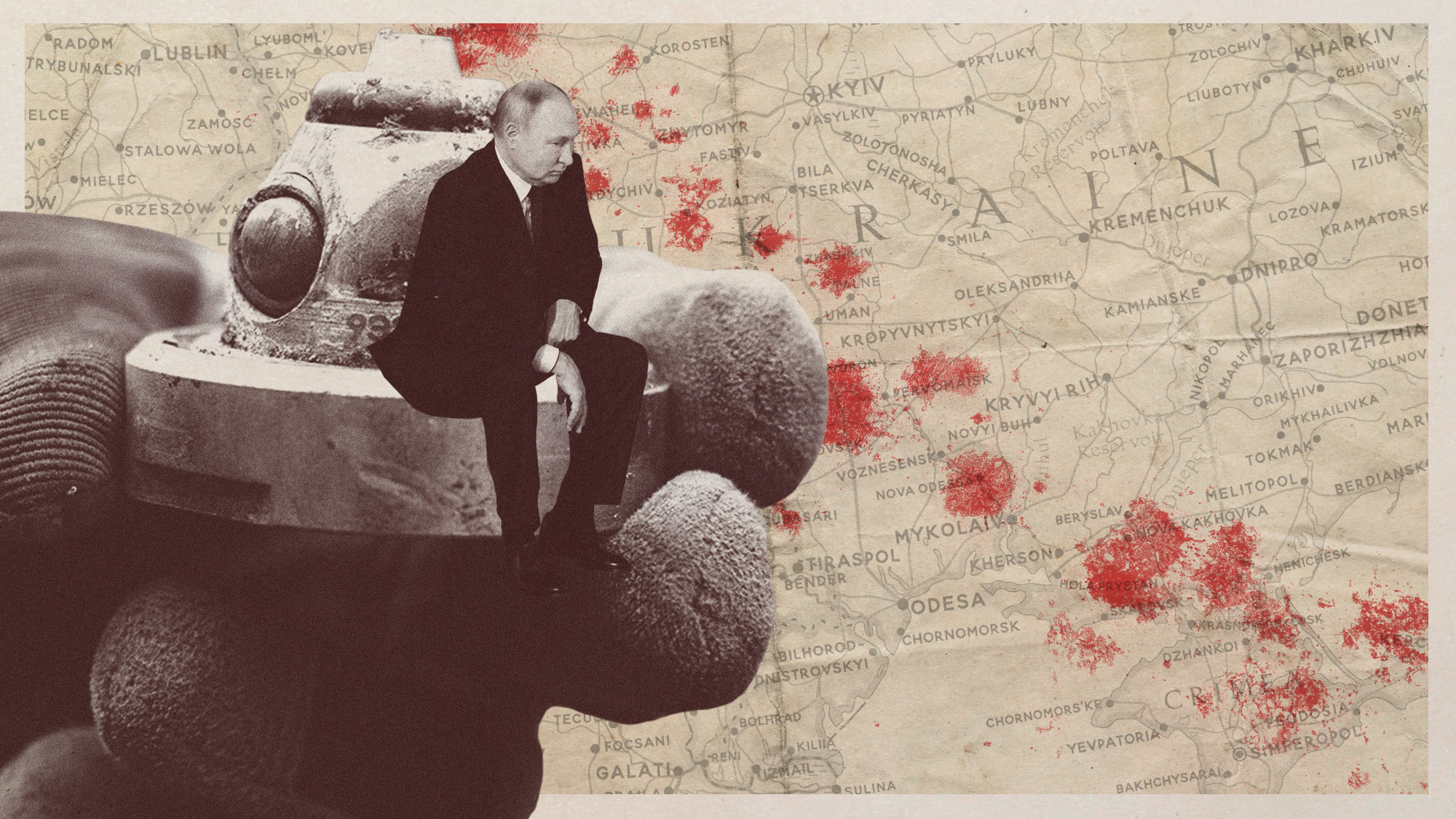Vladimir Putin’s plan for Africa
The first Russia-Africa Summit and Economic Forum takes place this week

A free daily email with the biggest news stories of the day – and the best features from TheWeek.com
You are now subscribed
Your newsletter sign-up was successful
Russia is hosting dozens of African leaders at a new summit where topics ranging from nuclear energy to mineral extraction will be under discussion.
More than 40 African leaders and 3,000-plus delegates from across the continent and Russia are attending the inaugural two-day Russia-Africa Summit and Economic Forum, which kicked off today in the Black Sea resort of Sochi, DW reports.
Multiple media outlets have noted the significance of the delegate list. Former Soviet client states such as Angola and Ethiopia, which have both maintained close ties to Russia, are unsurprising attendees, but large delegations from Nigeria, Ghana and Ivory Coast are also due to attend.
The Week
Escape your echo chamber. Get the facts behind the news, plus analysis from multiple perspectives.

Sign up for The Week's Free Newsletters
From our morning news briefing to a weekly Good News Newsletter, get the best of The Week delivered directly to your inbox.
From our morning news briefing to a weekly Good News Newsletter, get the best of The Week delivered directly to your inbox.
The latter three, which have some of the strongest economies - and largest populations - in Africa, have rarely worked with Russia and have few ties to Moscow, indicating that Russian influence in West Africa may be about to grow.
So what is Russia doing, and how might Moscow be looking to shape African politics?
What will happen at this week’s summit?
Today’s summit is the first major gathering of African leaders in Russia since the collapse of the Soviet Union in 1991 and will be held at Sochi’s Olympic Park, where Russia held the 2014 Winter Olympics.
A free daily email with the biggest news stories of the day – and the best features from TheWeek.com
According to Kremlin adviser Yuri Ushakov, all 54 African states are sending a representative, with 43 sending a head of state or government.
“Russia has things to offer in terms of... cooperation to African countries,” a spokesperson for Putin said this week.
In particular, the summit will likely focus on “pragmatic economic cooperation, military-technical partnerships, and Russia’s quiet soft-power push”, according to the Brookings Institution, which suggests that Russia is attempting to counter the influence of the US and China in Africa.
To this end, Russia appears to have two goals in mind, according to experts. First off, Newsweek suggests that Russian attempts to woo the African continent make sense on paper because of its “massive economic and political potential”. Meanwhile, from a diplomatic perspective, Voice of America says that “as far as Kremlin officials are concerned the event will... demonstrate the country is no longer a defunct World power”.
Manpower and money
Africa, from an economic perspective, is an untapped goldmine. Newsweek reports that around 60% of the continent’s rapidly growing population is under the age of 25, offering a “vast pool of workers even if many are not yet highly skilled”. Furthermore, the magazine adds, the continent has “abundant natural resources and since 2000 its combined GDP has grown by 5.1% per year on average”.
However, Voice of America notes that since the end of the Soviet Union, which funded and supported numerous revolutionary leaders in Africa, Russia has done “relatively little on the African continent” and has “lacked the money and will to expand ties with Africa”.
Recently, things have changed. Moscow has pushed hard for greater political influence on a continent with “54 United Nations member states, sprawling mineral wealth” and fast-growing markets for numerous commidities, Reuters says.
As a result of this drive, Russia’s foreign ministry has reported a 350% increase in trade with African countries over the past ten years, says The Moscow Times. Russian firms are also helping to set up major infrastructural work such as Egypt’s first nuclear power station and Zimbabwe’s mining operations.
Despite this surge, Moscow still “lags far behind competitors”, Reuters says. Russia says its trade with African countries rose to $20bn last year, but this is still less than half that of France and around ten times less than China.
Arms
Along with mineral wealth and a large potential labour force, Reuters notes that Africa also harbours something that Moscow will almost certainly be keeping a close eye on: “potentially lucrative markets for Russian-manufactured weapons”.
This, unlike trade, is a sector in which Russia is no small player: Moscow is the second largest supplier of arms in the world and is already a major supplier to African nations.
According to the Stockholm International Peace Research Institute (SIPRI), Russian sales of weaponry to African countries more than doubled between 2012 and 2017 and currently comprises just under 40% of Africa’s arms imports. This puts them far ahead of both China and the US.
Despite already dominating the African weapons market, the Kremlin appears to be hoping that this week’s summit will lead to more arms sales, with Reuters reporting that Russia “plans to put on an arms fair at the summit, showing Russian-made weapons including its S-400 missile defence system, other air defence systems as well as non-military equipment”.
What does Russia want on the world stage?
The Daily Maverick, a newspaper based in South Africa, cites several analysts who claim that this new summit is Putin taking advantage of the “retreat from Africa of President Donald Trump’s US administration”, and is part of the so-called “Scramble for Africa”.
This will see Moscow compete with other powers that already have similar institutionalised engagements with the African continent, including Japan, the European Union, France, China, India, Turkey, the Arab League and South Korea.
In an attempt to catch up, Putin on Monday hinted to African leaders that Moscow could “offer help without strings attached”, Reuters says, “unlike what he cast as the exploitative West”.
“We see how an array of Western countries are resorting to pressure, intimidation and blackmail of sovereign African governments,” Putin told the TASS news agency, suggesting that other superpowers were merely courting Africa to gain access to its natural resources.
But while its leaders may readily head to Russia for such economic opportunity, few of Africa’s leading pundits are buying Putin’s attempts to distance himself from exploitative practices. Kenyan paper The Standard claimed that this week’s summit is “in many ways borrowing from China’s playbook”.
“To expand its influence, Beijing in 2000 launched the Forum on China-Africa Cooperation and has poured tens of billions of dollars into the continent,” the paper adds.
“Russia cannot match China’s economic might but, like Beijing, it is prepared to support African leaders with controversial rights records in exchange for access to the continent’s riches.”
Furthermore, Putin’s comments are somewhat undermined by Chinese President Xi Jinping’s decision to pledge $60bn in aid to African leaders during a major summit in Beijing last year, which he explicitly stated came with “no political strings attached”, said The Independent.
-
 At least 8 dead in California’s deadliest avalanche
At least 8 dead in California’s deadliest avalancheSpeed Read The avalanche near Lake Tahoe was the deadliest in modern California history and the worst in the US since 1981
-
 Political cartoons for February 19
Political cartoons for February 19Cartoons Thursday’s political cartoons include a suspicious package, a piece of the cake, and more
-
 The Gallivant: style and charm steps from Camber Sands
The Gallivant: style and charm steps from Camber SandsThe Week Recommends Nestled behind the dunes, this luxury hotel is a great place to hunker down and get cosy
-
 New START: the final US-Russia nuclear treaty about to expire
New START: the final US-Russia nuclear treaty about to expireThe Explainer The last agreement between Washington and Moscow expires within weeks
-
 What would a UK deployment to Ukraine look like?
What would a UK deployment to Ukraine look like?Today's Big Question Security agreement commits British and French forces in event of ceasefire
-
 Trump peace deal: an offer Zelenskyy can’t refuse?
Trump peace deal: an offer Zelenskyy can’t refuse?Today’s Big Question ‘Unpalatable’ US plan may strengthen embattled Ukrainian president at home
-
 Vladimir Putin’s ‘nuclear tsunami’ missile
Vladimir Putin’s ‘nuclear tsunami’ missileThe Explainer Russian president has boasted that there is no way to intercept the new weapon
-
 How should Nato respond to Putin’s incursions?
How should Nato respond to Putin’s incursions?Today’s big question Russia has breached Nato airspace regularly this month, and nations are primed to respond
-
 Russia’s war games and the threat to Nato
Russia’s war games and the threat to NatoIn depth Incursion into Poland and Zapad 2025 exercises seen as a test for Europe
-
 What will bring Vladimir Putin to the negotiating table?
What will bring Vladimir Putin to the negotiating table?Today’s Big Question With diplomatic efforts stalling, the US and EU turn again to sanctions as Russian drone strikes on Poland risk dramatically escalating conflict
-
 Ottawa Treaty: why are Russia's neighbours leaving anti-landmine agreement?
Ottawa Treaty: why are Russia's neighbours leaving anti-landmine agreement?Today's Big Question Ukraine to follow Poland, Finland, Lithuania, Latvia and Estonia as Nato looks to build a new ‘Iron Curtain' of millions of landmines